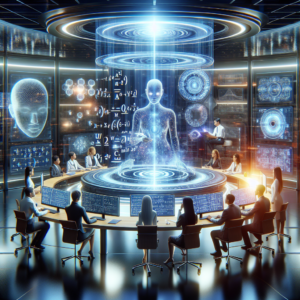The (Artificial Intelligence) Therapist Can See You Now
In recent years, the landscape of mental health treatment has undergone a significant transformation. Traditional therapy, often seen as the go-to solution for emotional well-being, is now being complemented by the emergence of artificial intelligence (AI) therapists. As technology advances, the ability of AI to engage in meaningful emotional conversations is becoming increasingly sophisticated. This blog post explores the role of AI therapists, their benefits, challenges, and the future of mental health care in an AI-driven world.
Understanding AI Therapists
AI therapists are digital solutions designed to provide mental health support through chatbots or virtual platforms. They use algorithms and machine learning to analyze human emotions and responses, facilitating a therapeutic experience that can be both accessible and effective. Here’s a breakdown of how these AI systems operate:
1. Natural Language Processing
Natural Language Processing (NLP) is a critical component of AI therapy. NLP enables AI systems to understand, interpret, and respond to human language in a way that mimics real conversation. This technology allows AI therapists to:
– Analyze the emotional tone of the user’s messages.
– Respond appropriately based on the context of the conversation.
– Maintain a conversational flow, thereby creating a more engaging experience.
2. Machine Learning
Machine learning empowers AI therapists to improve over time. By analyzing vast amounts of data from previous interactions, these systems learn to recognize patterns in human behavior and emotional responses. As a result, they can offer personalized recommendations and therapeutic exercises tailored to individual needs.
3. Accessibility and Availability
One of the most significant advantages of AI therapists is their availability. Unlike human therapists, who may have limited hours and availability, AI therapists are on call 24/7. This accessibility ensures that individuals can seek help whenever they need it, breaking down barriers to mental health support.
The Benefits of AI Therapists
The integration of AI into mental health care offers several compelling benefits:
1. Cost-Effectiveness
AI therapy can be a more affordable option compared to traditional therapy sessions. Many AI platforms offer subscription models or free services, making mental health support accessible to a wider audience. This financial accessibility is particularly beneficial for those who may not have insurance coverage for mental health services.
2. Stigma Reduction
Many individuals hesitate to seek traditional therapy due to societal stigma surrounding mental health. AI therapists provide a private and anonymous alternative, allowing users to engage with their mental health without fear of judgment. This can encourage more people to seek help and openly discuss their feelings.
3. Self-Paced Learning
AI therapists often incorporate educational content and therapeutic exercises that individuals can engage with at their own pace. This self-directed learning may empower users to take control of their mental health journey and practice coping strategies effectively.
Challenges and Limitations
While AI therapists offer numerous benefits, they are not without challenges and limitations:
1. Lack of Human Empathy
Despite advancements in NLP and machine learning, AI therapists still lack the genuine empathy and emotional understanding that human therapists provide. Emotional nuances, such as tone, body language, and personal connection, are difficult for AI to replicate fully. Users seeking deeper emotional support may find AI therapists inadequate.
2. Ethical Considerations
The rise of AI in mental health raises ethical concerns regarding data privacy and security. User data must be handled with the utmost care to prevent breaches of confidentiality. Additionally, the responsibility for outcomes—positive or negative—remains a contentious topic in the realm of digital therapy.
3. Dependence on Technology
As individuals increasingly turn to AI therapists, there is a concern regarding over-reliance on technology for emotional support. While AI can provide valuable assistance, it should not replace the human connection that traditional therapy fosters.
The Future of AI in Mental Health Care
The future of AI therapy holds great promise as technology continues to evolve. Here are some potential developments on the horizon:
1. Enhanced Personalization
As AI algorithms become more sophisticated, we can expect more personalized experiences. Future AI therapists may adapt their approaches based on individual histories, preferences, and emotional patterns, creating tailored therapeutic plans.
2. Integration with Traditional Therapy
Rather than replacing human therapists, AI may complement traditional therapy. Human therapists could use AI tools to track patient progress, analyze patterns in behavior, and even enhance the therapeutic experience by utilizing AI-driven insights.
3. Broader Accessibility
With advancements in technology, we may see increased access to AI therapy in remote and underserved areas. This expansion could bridge gaps in mental health care and provide support to those who may not have access to traditional services.
Conclusion
The emergence of AI therapists marks a significant turning point in the field of mental health care. While they offer valuable support and accessibility, it’s essential to recognize their limitations and the importance of human connection in therapy. As we embrace the potential of AI in mental health, a balanced approach that integrates technology with traditional therapeutic practices may provide the best outcomes for individuals seeking support.
Ultimately, the journey toward emotional well-being is unique for each individual. Whether through human interaction or the assistance of AI, the goal remains the same: to foster understanding, healing, and growth in a world that can often feel overwhelming. As technology continues to advance, it is our responsibility to ensure that mental health support evolves to meet the needs of every individual seeking help.



